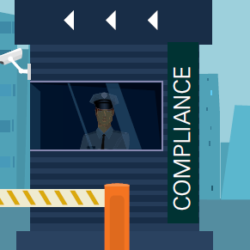Checklist for denied party screening

Successfully implementing a screening tool helps reduce the risk of fines, minimize audits, fosters sustainable practices, and stay compliant. However, the ROI of sanctions compliance itself is a challenge to measure, as there isn’t always a direct link to revenue generation and projected returns, but rather the value lies in avoiding risk and the associated costs of inefficiency.
According to a global survey by KPMG in 2021, companies on average conduct Restricted Party Screening on 90% of their suppliers and 81% of other third parties like logistics service providers, brokers and agents. This means businesses are leaving themselves open to dealing with sanctioned parties.
Staying compliant
The approach to measuring and maximizing the ROI of denied party screening software involves aligning and customizing the solution to fit the organization’s specific regulatory risk profile, and then integrating the solution with proper workflows throughout core business processes. The significance of aligning denied party screening software with organizational processes across various departments including sales, order fulfillment, procurement, and human resources to enhance operational excellence and compliance.
In order fulfilment, automation of denied party screening expedites shipping and enhances customer satisfaction. For procurement and logistics, automating screening saves significant time and ensures compliance. Additionally, integrating screening software across other business systems helps enhance processes, improving productivity and compliance. It can also help HR avoid risks associated with hiring or contracting individuals or entities streamlining their hiring and onboarding workflows.
Download the ‘Checklist for denied party screening’
This practical checklist developed by Supply Chain Movement and software vendor Descartes will help you to assess your compliance with business sanctions.
Find more checklists of Supply Chain Movement here >>










